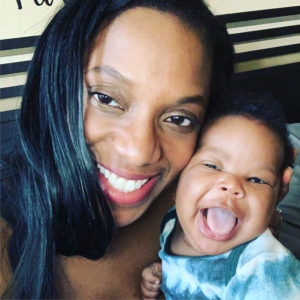My kid doesn’t like me. OK, I’m being dramatic. Of course, he likes me; I grew him in my womb and breastfed him for most of his life. Maxwell is shy around strangers, so when we are in public, he clings to me like cellophane. All that changes when we are at home, though. My ten-month-old son strongly prefers my husband Antoine.
Wait, prefers? Who am I kidding? He’s obsessed with his dad. Obsessed. His little eyes dart to follow him, and he belts out a blood-curdling scream when his father leaves the room. I noticed this very early, within the first few months of his birth. I’m a vocal person, so I shared my worries with my loved ones. “It will all change when you go on maternity leave,” they said. “He is just so used to you that he’s excited to spend time with Dad.”
Antoine’s paternity leave started immediately when I returned to work. I was convinced that the baby would flip parental roles, and I was ready to claim my title as the Favorite Parent. Returning to work was hard, but my saving grace was the thought that Maxwell would miss me so much that he would be stoked to see me.
After a rough day back at work, I pulled in the garage basically salivating for the celebratory greeting I was going to receive from my little guy. I walked in the house, triumphantly with a huge smile on my face. “Maxwell? Max? Mommy’s home.” Eagerly, I reached for my son, ready for a sweet embrace. Instead, he barely glanced at me before burying his head into Antoine’s chest.
He doesn’t like me.
I’ve said those same words, jokingly, on countless occasions, but this time they felt different. They felt more real. Logically, I know better. I am armed with two child-centered degrees in higher education that have taught me better. The rational side of me argues that playing favorites is a sign of emotional and cognitive growth. Maxwell is experimenting with his decision-making skills, exploring preferences and asserting his newly found independence. He’s making his own choices and expressing influence over his environment. I know this. I could write a book on this. Even still… it hurts.

How did I get through this tough stage? I haven’t gotten through it. I’m firmly in it, but I’ve found some ways to make it easier:
1. Being honest with myself about my insecurities has helped tremendously. My need to be the
favorite says more about myself than it does about Maxwell. It is not his job to affirm me and I
remind myself of that often. Admitting my own uncertainties about parenting has been
emotionally freeing.
2. Seeking out support from my family and friends is key. Words of affirmation are my love language and, selfishly, I want confirmation that I am doing a good job. Do I consider myself a good mom? Yes, but it makes my heart swell to hear other people say it.
3. Relying on my partner, sisters, and friends for advice has been helpful. It’s important to be
receptive to the feedback of loved ones. They see gaps that I can’t and give useful tips to help
strengthen my relationship with Maxwell.
4. I try not to let my hurt feelings affect my interactions. When I act deflated or pull away, it makes the situation worse. Defensive detachment is detrimental to the mother-child bond. When I feel sensitivity about our son choosing my husband over me, I put on a smile and try to join in the fun. When that doesn’t work, I busy myself with other tasks instead of communicating disappointment in front of my child.
5. Most of all, I maintain an attitude of gratitude. I have a beautiful, intelligent, hilarious son who adds so much joy to my life. Maxwell is such an amazing addition to our family and, instead of lamenting about him favoring my husband, I give thanks that he’s here. His bright smile and infectious laugh add the perfect musical notes to our family’s symphony.
I remind myself that parental preference is normal. It doesn’t mean that Maxwell doesn’t love us equally. His stronger pull towards my husband just means that we have different roles in his life. Relationship polarization is common in the early years and this behavior may continue throughout his toddler and preschool years. Choosing Dad over me is a way of testing his autonomy and control, which is a necessary part of his development and social-emotional growth.
Right now, though, I’m focusing on the blessing that Maxwell is. I may have to wait on my
husband to go to work before I get big hugs and snuggles, but it is always worth the wait.
Ironically, he’s laying on my chest as I type out this post. A few tears just splashed on his
smooth, chocolate-colored face, as I bask in the sweetness of this moment. I will gladly play
second fiddle in this beautiful orchestra, just to get a chance to enjoy the music.








